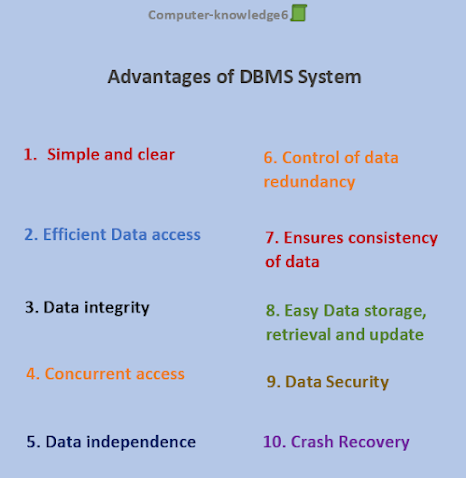In this article I am going to discuss about the advantages of DBMS System. If you don’t know about the DBMS System then don’t worry you get to know very shortly. But if you are very new to DBMS System then you have to know about the difference between traditional and DBMS System so you can clear why the DBMS System is important in 2024.
What is DBMS System?
Management of data involves defining structure for storage of information providing mechanisms for the manipulation of information. In simple words Database management system is a collection of interrelated data and set of programs to access those data. The collection of data referred to as the database which contains information relevant to an enterprise. The primary goal of a DBMS is to provide a way to store and retrieve database information that is both convenient and efficient.
Advantages of DBMS System
The advantages of DBMS System includes that how the database management system isdifferent from the traditional system.

1. Simple and clear :- As it clear from name that the DBMS system is very simple and easy to understand. With the help of Database management system the operations like data insertion, deletion and modification is very easy to implement.
2. Efficient Data access :- The one of the main advantages of DBMS System is that there is efficient and easy access of data in database management system. In traditional and files system it seems very difficult for data access of particular student but in DBMS system it is very easy and efficient way of accessing data.
3. Data integrity :- Data integrity means the data kept in the database is accurate and reliable. Basically the integrity means the set of rules for maintaining the quality of database or information. Thus Data integrity helps in to maintain the quality of information.
4. Concurrent access :- The other main advantages of DBMS System is that it provides the user to concurrent access. Concurrent access means multiple access at the same time so there is no conflicts related to accessing the data.
5. Data independence :- Data independence means the data should be accessible to anywhere without changing other data. For example if user changing the data at one level of schema than the data should not be changed to the higher level of schema.
6. Control of Data redundancy :- Data redundancy refers to the duplication of data. In file system this is the major issue of recording data because there will be lot of data redundancy in file system but it is the major advantages of DBMS System is that there is no data redundancy in DBMS System.
7. Ensures consistency of data :- Consistency means that the data should be organized in a particular manner or not. Thus it eliminates the threat of the item being updated on one system and not on another. Therefore it ensures data consistency.
8. Easy data storage, retrieval and update :- we can easily store the data in the database using SQL and oracle. We can also add new data , delete the data and update the data very easily. Thus it provides very easy retrieval and accessing of data.
9. Data Security :- In file system or any other traditional system there is no security of data. In traditional system there will be unauthorized access but in database management system it is not possible to access the data without administrator permission. Therefore the DBMS System provides full data security to their user.
10. Backup and Crash Recovery :- Crash Recovery is main advantages of DBMS System which totally differentiate it from the traditional system. Therefore the Backup and Crash Recovery play important role in database management system.
Conclusion
Above is all about the advantages of DBMS System but there will be more other advantages of DBMS System like easy to access data , integrity and security , easy to insert and delete etc. But moreover above is all the important advantages of DBMS System. But if you want to study more about the DBMS System then you can go through the various DBMS software like Microsoft Sql Server, MySql, MongoDB, Oracle database and so on.